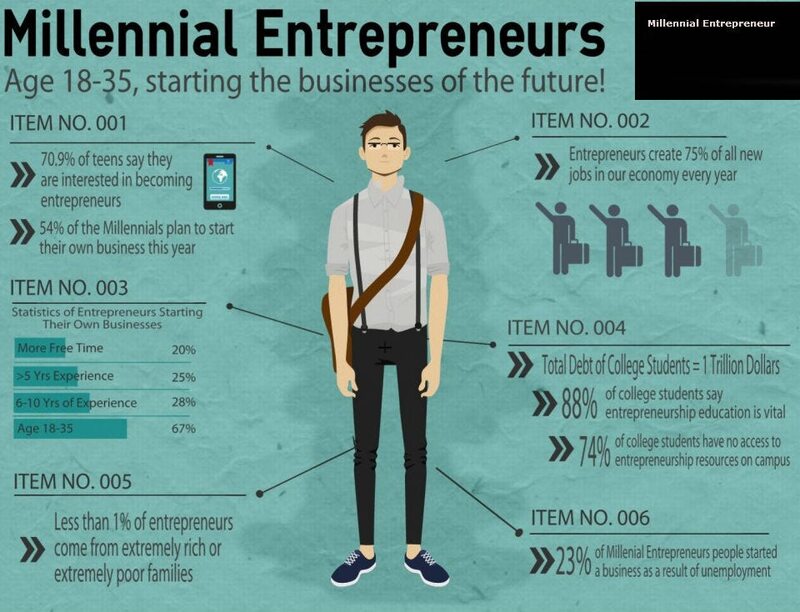Millennials Leading the Charge in Small Business Ownership
Oct 01, 2024 By Vicky Louisa
Millennials are reshaping the world of entrepreneurship, significantly contributing to the expansion of small businesses globally. More and more people from this generation are taking up business ownership, making a significant impact with new thoughts and an updated technique for supervision. This change has seized the researchers' interest who strive to comprehend what elements play into their successful enterprise undertakings. This article examines the outcomes of the latest research on small enterprises owned by millennials and what it could mean for the future course of entrepreneurship.
The Rise of Millennial Entrepreneurs

The generation called Millennials, whose birth years range from 1981 to 1996, are turning out to be among the most entrepreneurial groups in our recent history. Research in the past few years has indicated a notable growth of small businesses that are established and run by these millennials. This surge can be attributed to various factors such as simple reach towards digital tools, an increase in the gig economy, and cultural change favoring self-employment. Not only is the boom of small business among millennials because of advancements in technology but also due to yearnings for independence and flexibility within career choices. These businesses often show more ability to adjust according to modern market needs and what consumers expect.
- Growth Rate: The number of millennial-owned businesses has increased by over 40% in the last decade, showcasing their entrepreneurial spirit.
- Diversity in Ownership: Millennial entrepreneurs are often more diverse, representing a broader range of backgrounds compared to previous generations.
Key Motivators Behind Millennial Business Ownership
The reasons that push millennials to create their own companies are a bit different from older generations. Millennials, unlike baby boomers or Gen X, focus strongly on balancing work with life and having business models driven by purpose. A new study shows that a lot of millennial entrepreneurs aim for more than just making money - they want personal satisfaction as well as the chance to make good changes in society. Running a small business provides flexibility, enabling them to align their work with personal values and interests. Besides, many businesses owned by millennials emphasize sustainability, social responsibility, and ethical buying habits mirroring the overall inclinations of this age group.
- Cultural Impact: Many millennial entrepreneurs are motivated by a desire to address social issues, integrating purpose into their business models.
- Community Engagement: A significant number of these businesses prioritize local engagement and community-building initiatives.
Challenges Faced by Millennial Entrepreneurs
Even though they are innovative and ambitious, young entrepreneurs from the millennial generation encounter numerous obstacles that can hinder their ability to maintain a prosperous business. The research study reveals one crucial fact - getting access to funds continues to be a substantial hurdle. Plenty of these millennial business persons find it hard to get traditional funding because of more rigid borrowing conditions or the absence of credit records. Many people are now looking at other ways to get funding, like crowdfunding or lending from each other. Also, understanding rules and adjusting to new habits of customers may cause more stress. However, the research indicates that young people's skills in technology and ability to adapt can often assist them in finding clever solutions for these difficulties.
- Funding Sources: Millennials often utilize crowdfunding platforms to gain initial capital for their ventures.
- Regulatory Awareness: Understanding local regulations and compliance requirements is crucial for long-term success.
The Role of Technology in Millennial Businesses
Technology is very vital to the prosperity of small businesses run by millennials. The research shows that millennials have rapidly embraced digital devices, allowing them to streamline processes, increase their business size, and connect with wider audiences. They utilize technology in beneficial ways through platforms like social media marketing and e-commerce, options that were not accessible to older generations. For example, many of these businesses are established on internet retailing which reduces the overhead expenses and also provides a worldwide reach. Additionally, millennial entrepreneurs utilize data analytics, automation, and services based on the cloud. This enables them to make decisions rooted in hard information thereby advancing their business results.
- E-Commerce Growth: A significant portion of millennial businesses relies on e-commerce, which has seen rapid growth in recent years.
- Data Utilization: Leveraging data analytics enables millennial entrepreneurs to understand customer preferences and improve offerings.
The Impact of Millennial Entrepreneurs on the Economy

Small businesses owned by millennials have growing importance for the economy. The research shows that these millennial entrepreneurs inject billions into the economy while creating jobs for many individuals. Further, these small enterprises led by millennials often utilize contemporary work methods like working from home or offering flexible timings which may result in greater employee happiness and loyalty. Furthermore, such companies are typically more flexible and capable of reacting fast to changes in the market. They also have a higher chance to innovate within their sectors. This leads to economic growth and variety among business ecosystems throughout different industries.
- Job Creation: Millennial-owned businesses have created millions of new jobs, significantly impacting employment rates.
- Agility in Market: The ability to adapt quickly to changing market conditions enhances the competitiveness of these businesses.
Future Trends in Millennial-Owned Businesses
Moving forward, the investigation shows several trends that will probably outline the upcoming scenario for small businesses owned by millennials. A significant trend is turning to digital and online services as more and more millennials are avoiding conventional physical business setups. The growth in the freelance economy accompanied by a rising preference for working from home will also keep influencing how millennial businessmen manage their operations. There is a growing trend to focus on specific markets, as youngsters prefer meeting unique consumer needs instead of targeting general audiences. This method helps small firms gain dedicated customers and succeed in competitive environments. The research also highlights that young business owners will keep pioneering socially ethical and eco-friendly business practices, establishing standards for upcoming generations of entrepreneurs.
- Digital Transition: More millennials are expected to adopt fully digital business models, reducing physical overhead costs.
- Niche Market Focus: Catering to specific consumer needs allows millennial businesses to differentiate themselves in crowded markets.
Conclusion
The research about small businesses owned by millennials underlines the changing and progressive character of entrepreneurship in this age group. Millennial business owners are shaping business surroundings with their emphasis on new ideas, technology, and social influence. Though they encounter specific problems, their flexibility and futuristic mindset set them up for success in the long run. As the millennial generation keeps expanding their role in the small business domain, the knowledge gained from their experiences will provide useful guidance for future entrepreneurs and policymakers.







